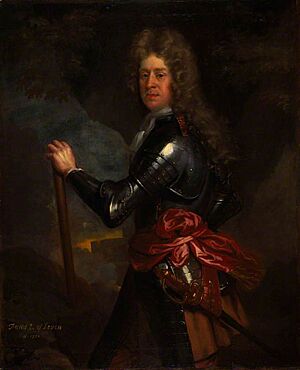David Leslie, 3rd Earl of Leven facts for kids
David Melville, who later became known as Leslie, 3rd Earl of Leven and also de jure 2nd Earl of Melville (born May 5, 1660 – died June 6, 1728), was an important Scottish nobleman, a leader in politics, and a soldier.
Contents
Who Was David Melville?
David Melville was the third son of George Melville, 1st Earl of Melville and his second wife, Catherine. Like his father, he supported the Whig political party and followed the Presbyterian religion. In 1681, after a rival claimant passed away, David was allowed to take on the title of Earl of Leven.
Early Life and Escape
In 1683, David and his father were suspected of being involved in the Rye House Plot. This was a plan by some Whigs against King Charles II and his brother, James, Duke of York. To avoid being arrested, they quickly left Scotland and went to the Netherlands. There, they joined other British Protestants who were living in exile at the court of Prince William of Orange.
A New Start in the Netherlands
Prince William used David Melville's help to get support from German princes for his plan to invade England in 1688. David himself raised a group of soldiers, known as a regiment, for this invasion. During this time, he received the surrender of the town of Plymouth in south Devonshire.
Military and Political Career
After the invasion, David Melville became a Privy Councillor of Scotland in 1689. This meant he was a trusted advisor to the King. He also fought in the Battle of Killiecrankie that same year. From 1689 to 1702, and again from 1704 to 1712, he served as the Keeper of Edinburgh Castle, which was a very important position. He also helped bring peace to the Highlands of Scotland starting in 1689.
Rising Through the Ranks
David Melville was the Governor of the Bank of Scotland from 1697 until his death in 1728. In the military, he was promoted to brigadier-general in 1702, and then to major-general in 1704. He became the Master of the Scottish Ordnance in 1705, which meant he was in charge of military supplies and weapons. In 1706, he became the Commander-in-Chief, Scotland, the highest military commander in Scotland.
Role in the Union
Also in 1706, he was chosen as one of the representative peers to sit in the House of Lords. This happened after the Acts of Union in 1707, which joined the Parliament of Scotland with the English Parliament to form the Parliament of Great Britain. He was promoted to lieutenant-general in 1707. He also helped negotiate the Union as a Commissioner for the Union in 1707. He served as one of the first Scottish representative peers from 1707 until 1710. In 1712, he was removed from all his official positions.
Later Years
On May 20, 1707, David Melville inherited the title of Earl of Melville from his father. However, he chose not to use this title.
 | George Robert Carruthers |
 | Patricia Bath |
 | Jan Ernst Matzeliger |
 | Alexander Miles |


